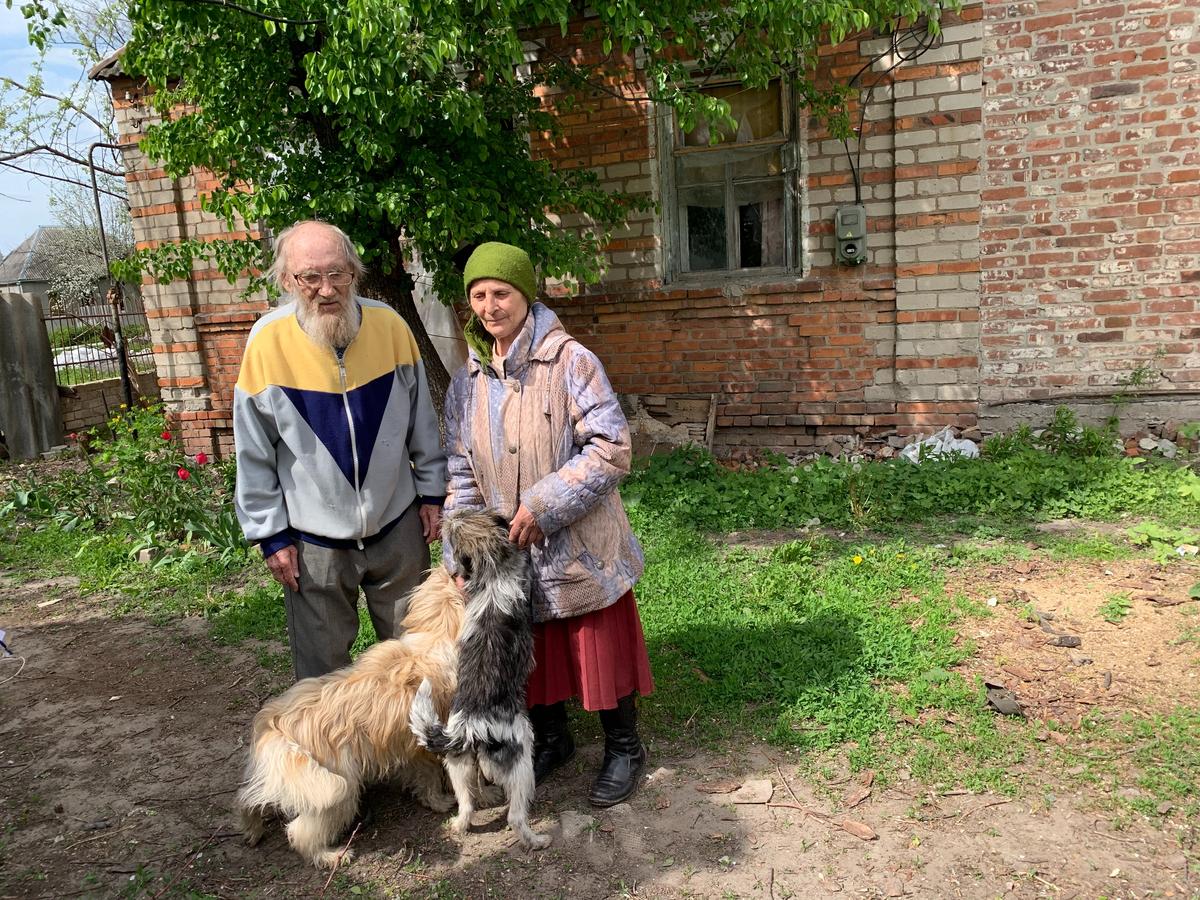
Anna Ivanovna and her husband next to their house. Photo: Olga Musafirova
"Oh, Anna Ivanovna, what are you wearing today?"
She was waiting with the door of the hospital ward open, surrounded by sacks of various sizes (the largest one was placed on the cart, which is called “kravchuchka” in Ukraine), anticipating her visit back to the hut that she was forced to leave after a Russian shell had exploded right outside the house.
Anna Ivanovna lively fidgeted with the bag strap on her chest. One could peek a fancy bow on the side of the bag, made from two silk ribbons, blue and yellow.
"Oh, this one? I had it on the box. They brought me treats for Easter. Looks like our flag… It’s beautiful!"
She turned to her husband, who lay down on a bank. He was wearing a jacket and a peaked cap and did not seem to be particularly eager to leave the place with its doctors, injections and hot, though not very nutritious military meals, which they served three times a day.
"Get up, Alekseich. It’s high time."
He was deafened by that very explosion. But Ivan Alekseevich Ivanov, gray-haired, short of breath, with a bunch of diseases, barely moving his legs — perfectly heard and absolutely obeyed his wife. Now even more when Anna Ivanovna had — God forgive such an assumption — one of the brightest moments of her 69-year life.
Volunteers drove the car right to the steps of the hospital, loaded the bags. After the trip, which included an inspection of Severnaya Saltovka, the most bombed district of Kharkiv, the spouses were to be looked after by a neighboring medical institution, already familiar to them. Anna Ivanovna took a place in the back seat, next to Ivan Alekseevich, and they whispered a prayer together, crossing themselves every minute…
Quarters of the Saltovka — high-rise blocks with a black, charred core — stretched out in Svetlaya and Metrostroiteley street; car frames, broken gas stations and shops in Druzhby Narodov street could be seen out of the car window.
One of the streets turned into a dead end, and they had to turn back: part of the house collapsed, blocking the road.
"People died in their flats, and were lying there. The bodies could not be taken away: shelling," said Maks, the taxi driver. He, like most activists, helped to clear the wreckage, took the victims who had lost their homes to metro stations, which became both a bomb shelter and a home. "You're not local, are you?"
"It’s awful. That’s a real war like the one in 1941," answered Anna Ivanovna. "We are locals, we are."
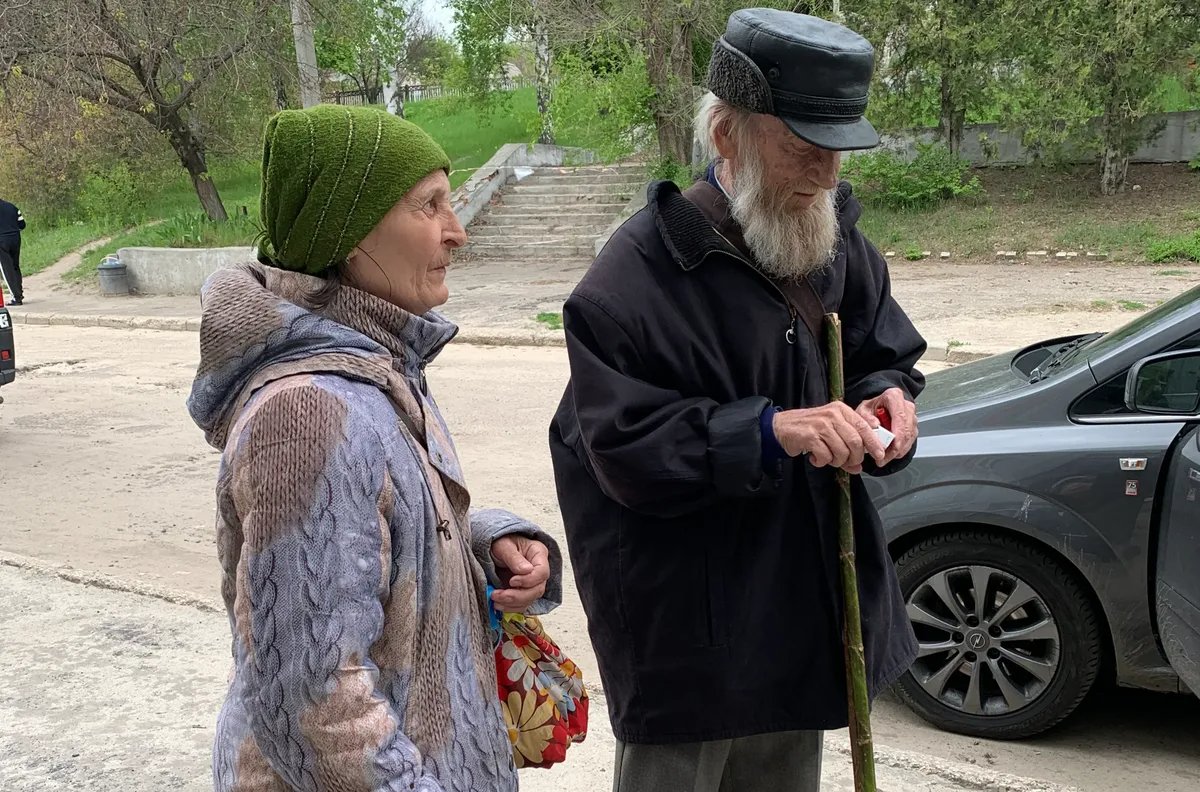
Photo: Olga Musafirova
Grandmother for all of Russia
It would seem misery is everywhere. Their village, Velykaya Danilovka, in fact, a suburb of Kharkiv, was affected to the greatest possible extent. But for the second month in a row, a simple Ukrainian pensioner got the glory, which she did not even dare to dream about before. She was interviewed. The image of an elderly woman with a red flag was stamped in cardboard and plastic, painted on murals, posters and postcards. Rogozin even promised to launch her into space (not Anna Ivanovna herself, but her image). Deputy Head of the Presidential Administration of the Russian Federation Sergey Kiriyenko came at the opening of a monument of rare ugliness in occupied Mariupol and delivered a speech where he admitted (I quote): “We don’t know her full name… (akin to 'your name is unknown, your deed is immortal' written at the Tomb of the Unknown Soldier — Olga Musafirova), but she became a grandmother for all of Russia”.
Why? The reason is a video that hit the Internet in early April, where a middle-aged woman with a red flag comes out of the gate to the Ukrainian (chevrons are clearly visible) military men. And she says that she was waiting and praying for them and for Putin. Explosions sound in the background. The military — everyone communicates with each other in Russian — react calmly. A woman is handed a bag of groceries. She refuses, saying that soldiers need it more. Then she takes the package, and one of the men takes the flag, saying “Glory to Ukraine!” and stomps his feet on the banner cloth. After a short confusion, the woman, outraged with the sacrilege of the flag, rejects the gifts. She says: "My parents died for it!" End of the record.
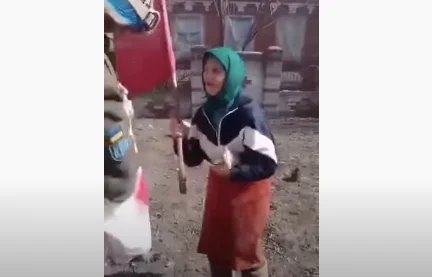
Screenshot
Needless to mention the effect it produced among the Kremlin propagandists. The video got to them as a gift from above at the moment when cruise missiles, air bombs and heavy artillery were thrashing Kharkiv, Velykaya Danilovka and the woman herself?
The following transfer of Anna Ivanovna and her husband to Kharkiv hospital No. 8 caused a new adrenaline rush in the Russian Federation. The Ukrainians conceived to torture the brave Soviet grandmother to death! The head of the National Defence Control Centre of the Russian Federation, Colonel-General Mikhail Mizintsev (it was he who ran the blockade of Mariupol and gave the order to bomb, among other things, the maternity hospital and the children's hospital) publicly announced (I quote): “Artillery mounts and an ammunition depot are located on the territory of the clinical hospital No. 8 in Kharkiv”. So the grandmother's fate is sealed…
The Kharkiv authorities took Mizintsev's warning seriously. All the patients from hospital No. 8, not just Anna Ivanovna and her husband, were allocated to different clinics. Hospital No. 18, where the old lady was moved to, tensed up. Russian lawmaker Nina Ostanina proposed to find a way to evacuate the great martyr from the lion’s den to the territory of Russia…
But the rescue operation to free the old lady from Ukraine did not take place. A new video with the participation of Anna Ivanovna was getting hits online, different from the one that made her famous all over Russia, where “the grandmother with the flag” complained:
“It’s a nasty thing that Russia turned its arms against Ukraine. It’s awful.”
To save Russians from disappointment — monuments in honour of the old woman were already set up! –political scientist Sergey Markov wrote on his blog: “Of course, we all understand that the SBU just knocked these words out of the woman. They probably threatened her. And, perhaps, they even beat her … But it turned out we were wrong. It turned out that the SBU had not yet been able to find the old woman. They could not get anything from her. The SBU simply filmed a woman who looked like our heroine; another woman. Various experts analysed the manner of walking and speaking, and concluded that this is a fake. The woman is a sham, a fake. The grandmother with the red flag of Victory remains the hero of our time”.
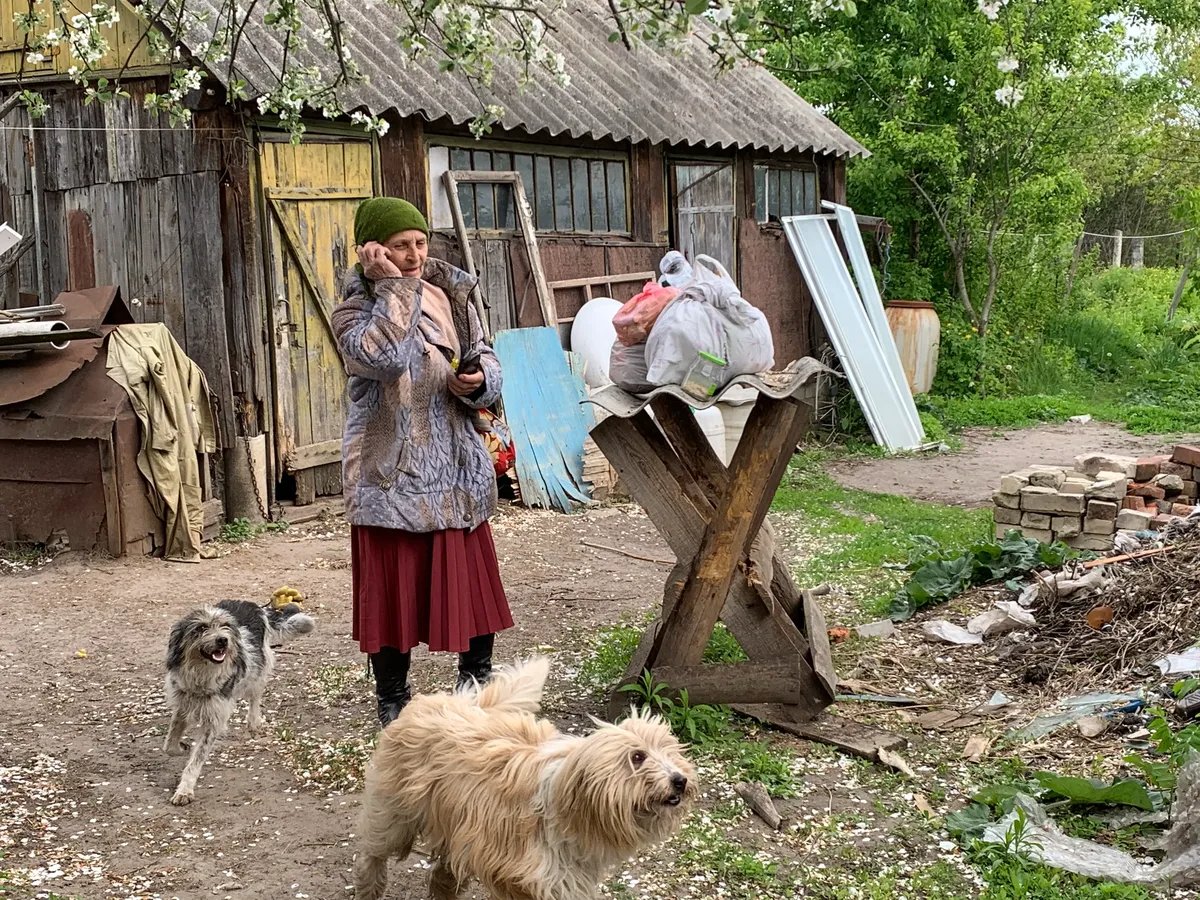
Photo: Olga Musafirova
How I interviewed Anna Ivanovna
We got to Velikaya Danilovka, still praying. The cottage part of the village looked stunning, even with the holes in the roofs. The taxi driver nodded: the place used to be ritzy, not everyone could afford it.
The Ivanovs' house was located on the outskirts, almost near the forest, and it looked differently not only from the rich neighbors, but also from the typical village houses surrounding it. Frankly speaking, even the ruins, hit by a shell, looked less sad. A rickety fence, a lopsided shed made of slabs, endless iron and rag rubbish that had been lying in the backyard for a long time. However, tulips were blooming in the flowerbed in front of the windows, and the patterns of limestone red brick in the design of the facade hinted at bygone into oblivion better times. Two shaggy dogs rushed towards Anna Ivanovna. A scraggy British shorthair cat climbed over the skirt of her dress purring out the fullness of its feelings.
"Poor thing, your nose is warm, you’re sick…" Anna Ivanovna hugged everyone in turn. "I’ve got crackers, here you are."
Little, brown-eyed, quick and easy-going, she, an elderly girl, evoked the desire to protect her. We sat down, having cleared out a space in a small room, it seems, the only one with an unbroken window, in front of the home iconostasis, where they piled up Orthodox calendars, prayer books, and notes. Other windows were blown out by an explosion along with the frames in March, while it was still cold.
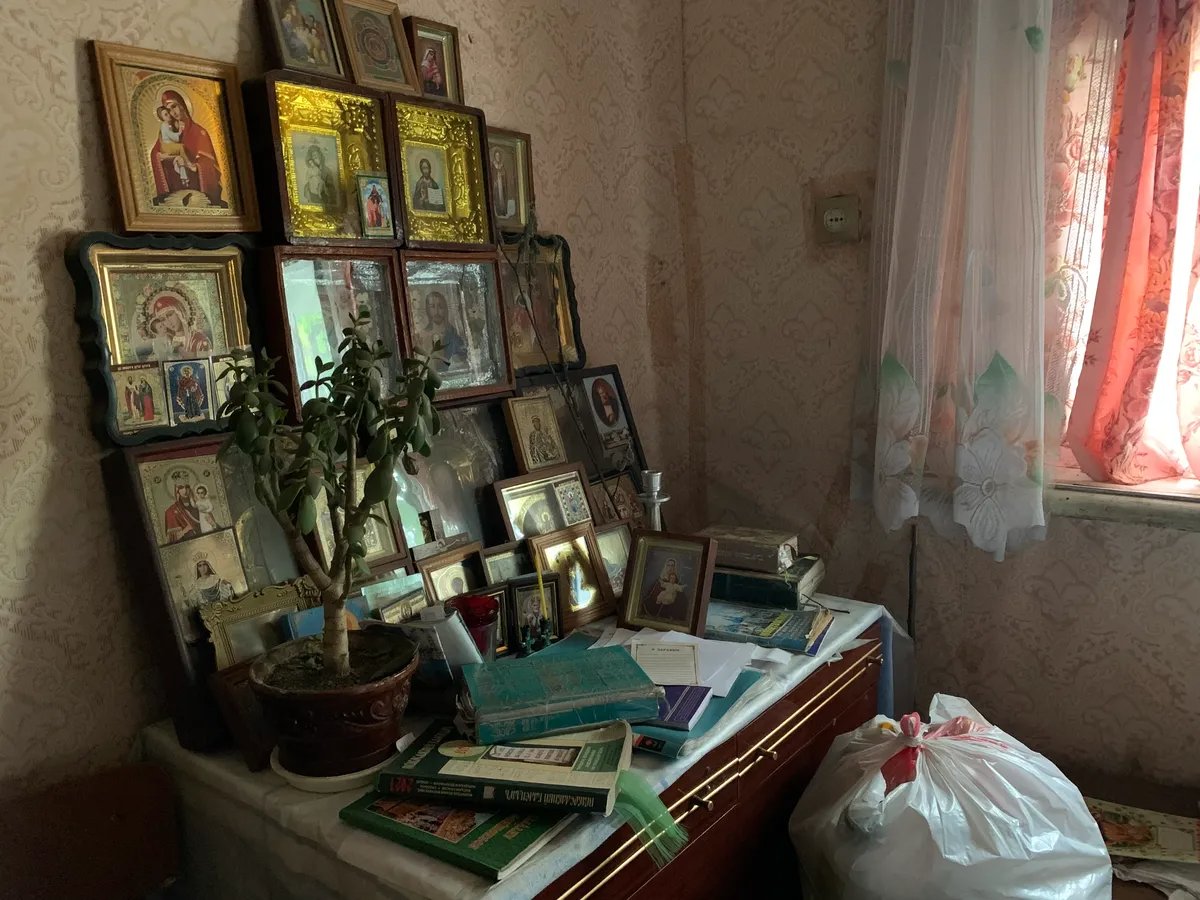
Photo: Olga Musafirova
She opened one of the notebooks and sang an Easter prayer in a ringing voice. The open door to the large room made it possible to see jars, bowls, basins with something moldy inside, a pile of clothes and… a balalaika on the cupboard.
"Do you still play?" I blurted out.
The woman pointed her finger somewhere into the room: there is a second one, but the strings are broken. Harmony lived in this house. I imagined Anna Ivanovna and Ivan Alekseich, a native of Belgorod, to sing to the accompaniment either Russian or Ukrainian folk songs, switching from Russian to Ukrainian language.
"Alekseich has never offended me in forty-three years," Anna Ivanovna smiled. "We only cursed at each other."
She explained:
"That’s not my first marriage! The first husband was Russian. But he took the wrong turn and got to prison for eight years for theft. And I went to work at the Kommunar plant, which produced televisions. Used to make screws of different sizes. I enjoyed that varied job. Only it was really oily — my hands were always covered in oil when we assembled parts."
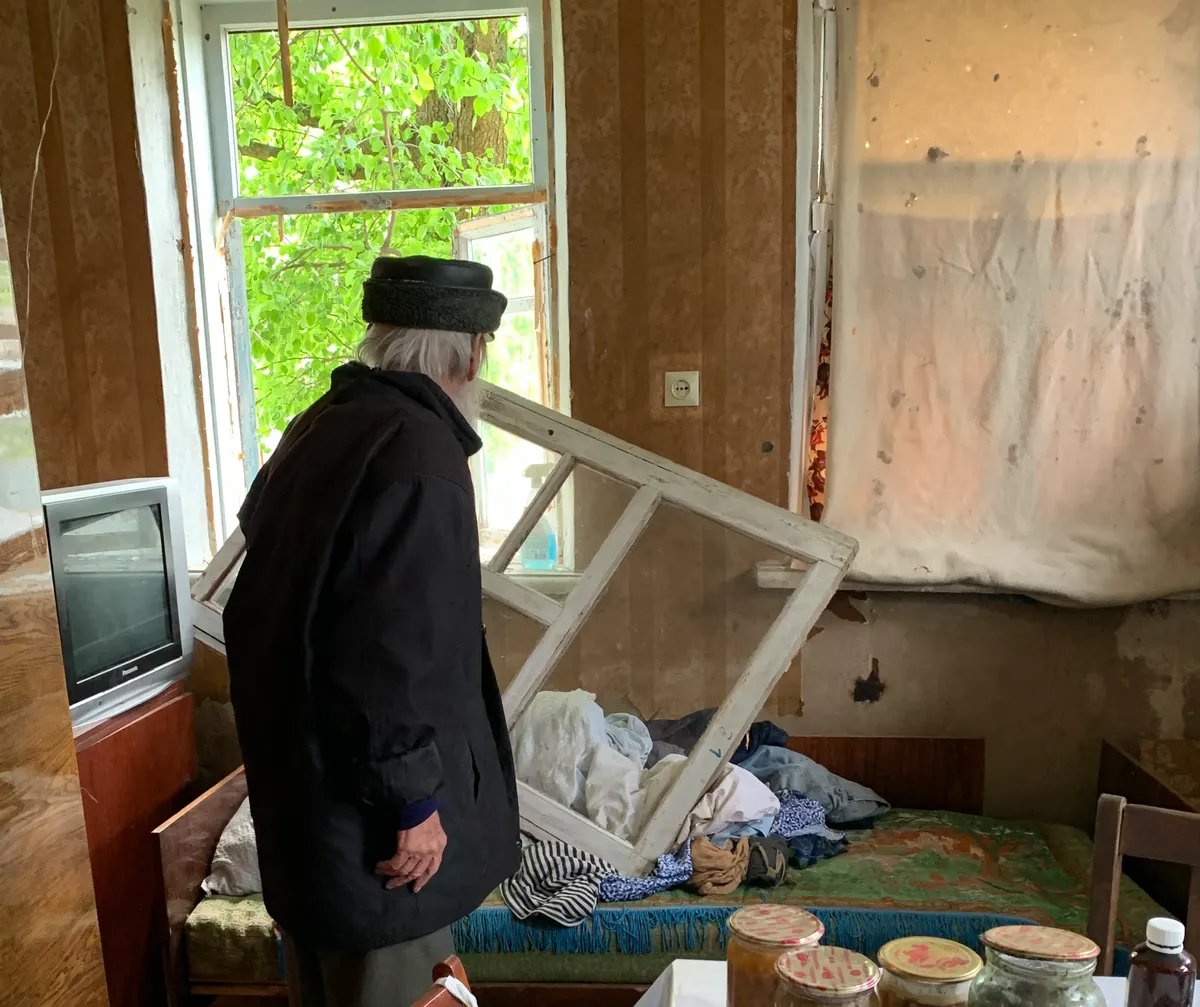
Photo: Olga Musafirova
It turned out to be a never-ending story: a second marriage happened. Several guys from the military unit got into the habit of walking into their street. One of them dropped in on Anna Ivanovna's mother: "Hey, mum, do you have some booze?"
But her mother was not taken aback:
"If I’m your mum, are you looking for vodka or a bride? My daughter is your bride, but she’s looking after the child."
"He married me even though I had my son from the first marriage. He beat me hard. When sober, the man would pull the weeds in the garden, and he really had a clever pair of hands, but when drunk..." Anna Ivanovna sighed. "Once he beat me almost to death. Then took a bucket of water, poured it on me — as he says, healing me, and went away for vodka. I was working as a milkmaid. A friend looked in, and was horrified. She took me to the hospital. After a while, he called: 'Enough festering in bed, it’s haymaking time!' I can mow and rivet a scythe; I can sharpen an electric saw if necessary… Can't I live without a man?"
While moving from place to place, her parents and younger brother bought a house in Velikaya Danilovka. By that time, she had two sons to bring up.
And she gave birth to a girl.
"I got maternity leave, I needed to go to the hospital to have my tooth removed. Left the child to my mother-in-law," Anna Ivanovna wanted to speak out. Interest even from strangers, journalists, caused gratitude.
"And my mother-in-law put the little one on a hot bench, on the kiln. Roasted the child. I returned and buried my daughter. She would have grown up beautiful! She had eyelashes like a doll! Such a funny life… "
"God gave me the strength to endure the pain. Although, when Alekseevich and I got together, I was faithless. Only after our daughter died, she was suffocated by the smoke… No idea how and why the linoleum caught fire."
The sons died as well. Took a low road. The elder son left her with the grandchildren.
The cat was chafing against Anna Ivanovna's arms: it was bored. The grandchildren didn't like her. A powerful conflict within the family increased the gap, the war did not change anything. Only the faithful Alekseich, who was now groaning in the hallway, trying to fix something in the household, remained by her side.
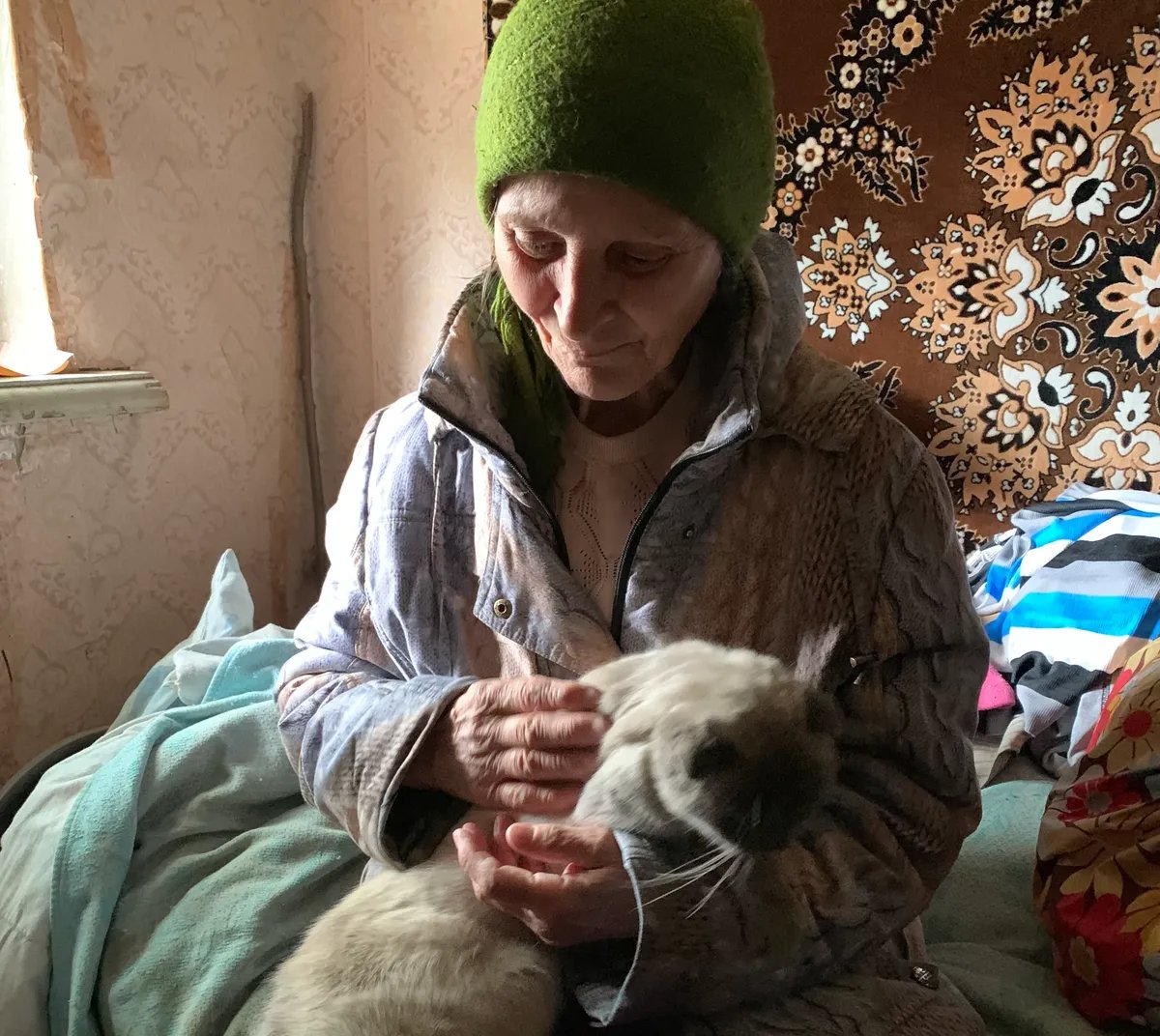
Photo: Olga Musafirova
The woman told the volunteers that she had changed her mind — the couple would not return to the hospital.
"We will heat up the stove, wash, boil potatoes. As for the windows — well, what about them? It’s already warm outside. Volunteers will bring us some bread."
"There is almost no one in the village! The shop is closed! Shelling is everywhere!" we tried to tell her.
"Oh, honey, I wonder if it’s the right decision," Ivan Alekseevich coughed. But the wife shook her head.
I dared to tell Anna Ivanovna that, according to the latest data available in Russia, she was not real. Especially with a bow in the colors of the Ukrainian flag. The woman was offended. She rummaged in her bag, took out a shabby passport: there you are! I looked at the official photo, which, as a rule, turn out to be unsuccessful, and saw a pretty woman in a sheer blouse and brown eyes who looked like with Anna Ivanovna. Even Markov wouldn’t call her “a grandmother”.
"I’ll be seventy in June," she clarified. "Well, you asked me about my age."
I started to question further: did she have old albums at hand? She really was a rose of the village!
"Well, I can’t find anything in here,” Anna Ivanovna looked at me with some interest:
"War does nothing good to anyone at all."
“To question” (pytati) in Ukrainian sounds like “to torture” (pytat) in Russian. A pretty piece of linguistics.
Family heirloom in the shed
The story with the red flag by Anna Ivanovna is no less amazing than her life.
She divorced Alekseich (“To get separate apartments in Kharkiv!”) and married him again, and the family finally settled in Velikaya Danilovka two years ago.
"My mother and brother died in my arms. Light and gas was cut off because of debts. Spider webs hung from the ceiling like black curtains. I regret that I didn’t call the reporters and didn’t let them film it!" recalled Anna Ivanovna.
She threw away not a thing out of her parent's belongings, including the flag, which, in times of the Soviet Union, was hung on the house every holiday. It was kept in a shed together with the firewood.
Anna Ivanovna's face became artistic, inspired, as when singing the Easter prayer:
"I was offended when Vitya called it 'the enemy's flag'. When the red flag was hung over Berlin, the war ended immediately! I wanted to do the same thing … Hitler said: 'I will conquer the country, I will castrate men, and women will grow our race!' And the red flag means peace, love and happiness in the family."
"Who is Vitya?"
"Vitya and Igor are soldiers. They were near the trenches, guarding us. I came to the post to thank them. They often brought food to Alekseich and me. I’ve written down their names in my little book and pray every day."
A clarification for those who didn’t get it.
Viktor, the platoon commander of the Armed Forces of Ukraine with the call sign "Cadet" and his partner, Sergeant Igor, began patrolling the "grey zone" — Velikaya Danilovka on March, 4. They looked after the hosts — in majority, elderly people. They brought us dry provision rations— a silver lining under the gun, but anyway. "Cadet" was so touched by the pensioner with a banner and her speech that he ordered the sergeant to film everything on the phone so that other people would appreciate it…
The Centre for Strategic Research and Information Security, a unit under the Ministry of Culture of Ukraine (the structure is designed to debunk fakes in the national media space) has no idea how the film got on the Web a month later. It assessed the plot: “Morons”. Asked to take into account: it is better not to remind the Ukrainian military about Putin. The Centre shared “Cadet’s” mobile phone number with particularly annoying journalists. And he made an effort to retell everything from the beginning, or asked to call back after the fight.
It was Viktor and Igor who ran to save the Ivanovs when a Russian mine flew into their yard. They took the family to a shelter — a local church, to the “rich” region of Velikaya Danilovka. I went there too.
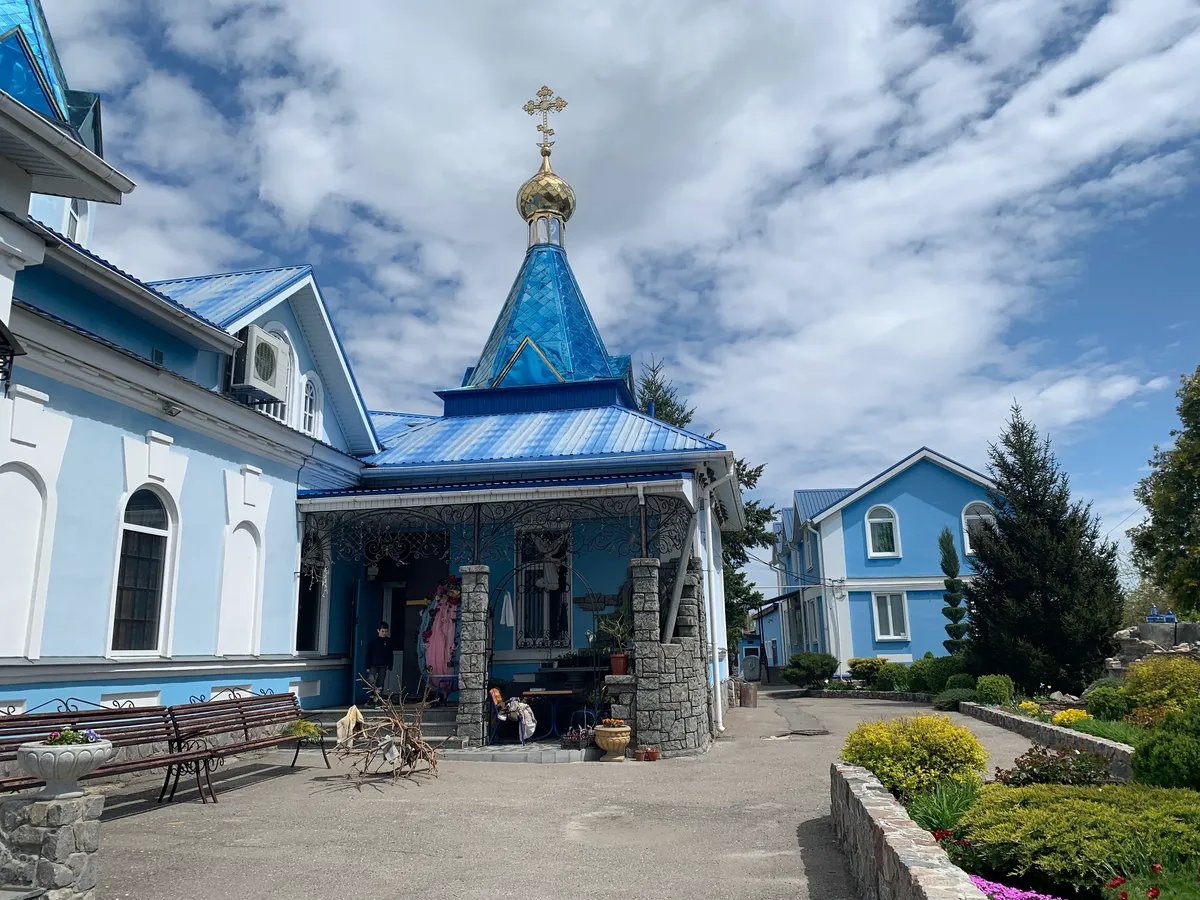
Photo: Olga Musafirova
There are black traces of splinters on the walls of the sky-blue, ancient church. Mother Anna, stroking one of the “wounds”, began to cry:
"How come? I am from a family of a priest, relatives live in Belgorod, father Andrey graduated from the Moscow Theological Academy. He has served here for thirty years. The parish tried to help the church. Such a beauty all around, just have a look! And now we're only shedding tears. Putin is a madman!"
Father Andrei raised an eyebrow. But it seems that the wife was leading the way in this family.
We entered the church. A row of mattresses covered with colorful rugs lay under the canopy, opposite the altar.
"We pray and spend nights here," the priest explained. "It is important for me that everyone who is in the village remains alive."
We had a ping-pong conversation in the backyard, where Father Andrey showed casings of Russian shells (“We’ll hand them over as scrap metal later!”):
"They say that since the beginning of the war you stopped mentioning Patriarch Kirill at services?"
"Who is 'you'? And who says that?"
"'You' as the Ukrainian Orthodox Church of the Moscow Patriarchate. I heard about it from Ivanova, for example," I accidentally mentioned Anna Ivanovna, specifying that the woman returned to the village. Father Andrei raised his eyebrow again. And retorted:
"We are a Ukrainian Church. Show me where it says 'Moscow Patriarchate'? So, you decided to check whether I mention Patriarch Kirill or not? It's sad. You need to trust people."
To cut the long story short, I did not get any detailed personal characteristics of Anna Ivanovna in terms of religion. Except for the flashing word “restless” …
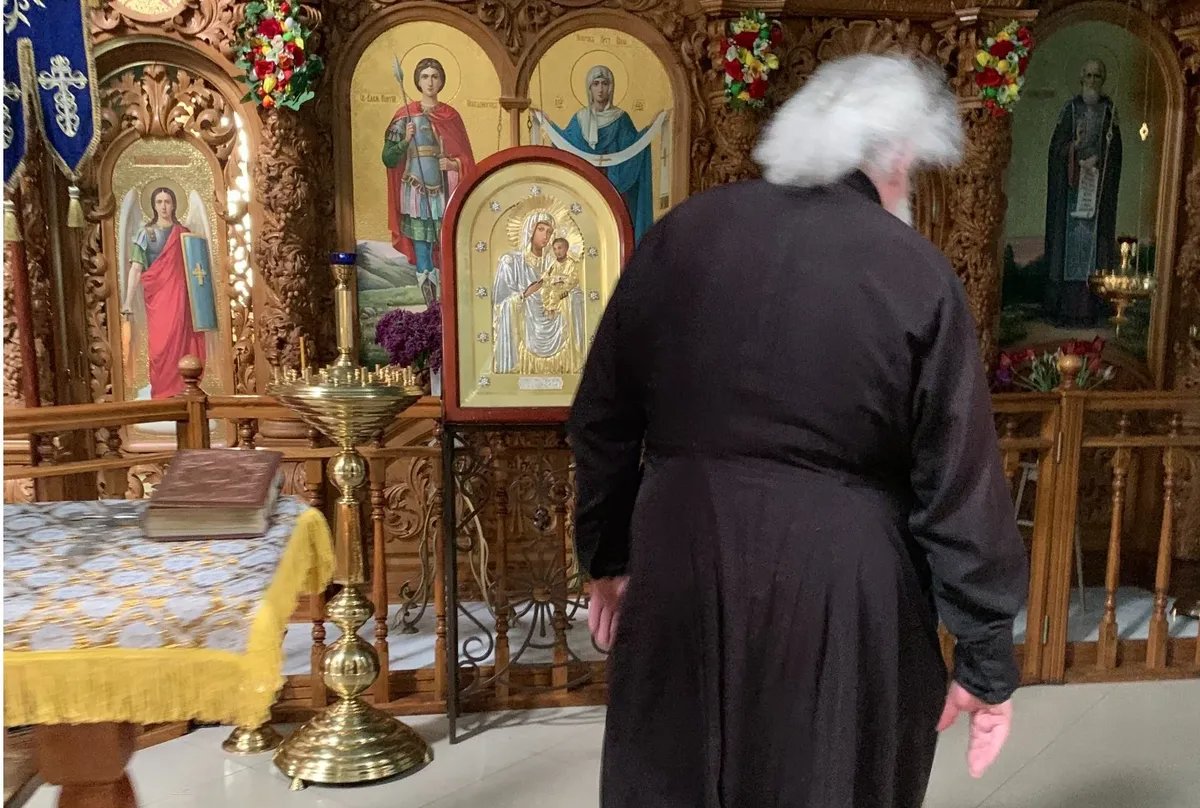
Father Andrei. Photo: Olga Musafirova
Who’s under the red flag?..
In the meantime, a crowd gathered in the street, near the fence of the Ivanovs.
A BBC film crew came to film a story about Anna Ivanovna. Volunteers from Kharkiv represented by Nikita Solovyov came to examine the amount of the necessary restoration work. Several neighbors showed up to the noise of engines, voices and barking of dogs: the place turned out to be rather bustling.
After Solovyov, a physicist and mathematician by degree, a financial analyst and macroeconomist by profession, measured window frames with a tape rule and examined the holes in the roof, we talked a little about the peculiarities of Ukrainian humanitarian volunteering after February, 24.
"It’s easy to help like-minded people, soul mates," Nikita shared. "But even those who I’d rather just whack at their head with a crowbar, figuratively speaking, need help. And we provide it. A person's political views are irrelevant. Even if they take the service for granted. Or they argue: 'It’s not the Russians who are shelling us. Something flies just from there, from the universe. And the food and medicine come from the other side of the universe. Not always on time. Not always what we like, but let it be…'"
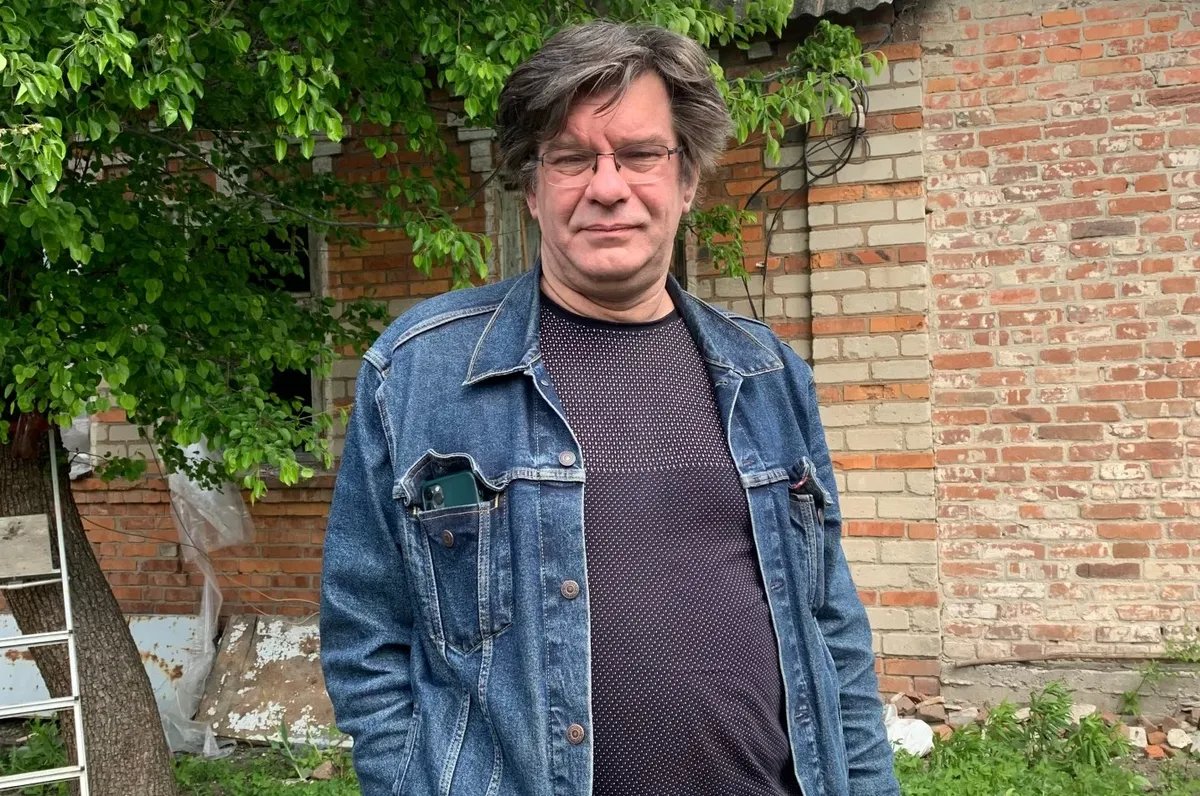
Nikita Solovyov. Photo: Olga Musafirova
"We have a group of guys who have been doing windows only since the beginning of March. They do not glass, but cover them up with the tape — can you imagine the amount of work in Kharkiv after the air raids? Now it's a matter of discomfort, and fourteen degrees below zero it was a matter of survival. Other colleagues have concentrated on pharmacies, getting and distributing medicines, and so on. After the victory, if I meet with such people, we will discuss everything. And now it doesn't matter at all."
At the back of the yard, sitting on a stool, Anna Ivanovna was talking to the camera:
"We are peaceful people! Russia has attacked Ukraine and is destroying it. Why? I would like to say to President Putin…"
"Will you take me to the hospital? If she refuses to go… It's scary here."
An elderly blonde woman who introduced herself as Nina Lavrentievna, the Ivanovs' neighbor, struggled with herself not to share the secret. But she was a truth-teller:
"Make inquiries, her pension payment is three thousand hryvnias, her husband’s is four thousand. They could do a wonderful repair of the house, buy everything in the world. Have you come into the house?…" she lowered her voice. "They play — I forgot how my grandson called the game. They transfer money somewhere by mobile phone in order to get even more money later."
Anna Ivanovna gladly arranged a “reconstruction” for the shooting. She appeared at the gate again with a red flag unfolded, wearing a Soviet sweat jacket over a dressing gown and with a pile of photographs of a monument to herself.
The plot finally ran into the old Soviet comedy “Wedding in Malinovka”. Nikita took a cigarette and went away for a smoke.
Olga Musafirova — exclusively for Novaya Gazeta. Europe.
Kharkiv region
